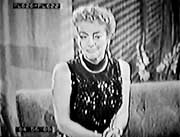 PETER HAIGH: Well, so, for the past two weeks, we've opened our
program with news of Joan Crawford and her visit to this country. And, it's a
proud moment for Picture Parade because Joan Crawford has joined us
tonight to tell us a little about herself, to talk to her about her new picture,
and I think I should tell you, it's her first appearance on television,
ever. Welcome, Joan.
PETER HAIGH: Well, so, for the past two weeks, we've opened our
program with news of Joan Crawford and her visit to this country. And, it's a
proud moment for Picture Parade because Joan Crawford has joined us
tonight to tell us a little about herself, to talk to her about her new picture,
and I think I should tell you, it's her first appearance on television,
ever. Welcome, Joan.
JOAN: Hi Peter, how are you?
PETER: You're frightened, aren't you?
JOAN: Yes, I'm scared!
PETER: Really?
JOAN: Yes.
PETER: Joan, there are thousands of things I want to ask you and I don't quite know where to start. But, first of all, I think let's take glamour. Now will you tell me, A) What is your recipe for it?
JOAN: Just live.
PETER: Just live?
JOAN: Yes.
PETER: Simple as that?
JOAN: Live with a lovely family, raising children. I don't mean live gloriously and make every day the Fourth of July. I mean just live.
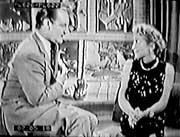 PETER: A perfectly ordinary life. Well, what about...tell me
something about the um...young people of today. The young and up and coming
actors and actresses who I know you do a lot to encourage. Now is this search
for talent something that you've been doing for a long time?
PETER: A perfectly ordinary life. Well, what about...tell me
something about the um...young people of today. The young and up and coming
actors and actresses who I know you do a lot to encourage. Now is this search
for talent something that you've been doing for a long time?
JOAN: Well, I've tried to.
PETER: And who have you found? Apart from, of course we know Jack Palance is one.
JOAN: Well, I don't know what you call it here, but at home we call it "look in the morgue." That means everyone's dead.
PETER: What?
JOAN: But you know we're not.
PETER: Yes, I do.
JOAN: But, you look "in the morgue" to find out...uh, who has helped whom and, uh...what do you call it here?
PETER: Well, I don't think we have a similar phrase at all. At least, not that I can think of.
JOAN: Well, the newspaper...uh, briefs.
PETER: Oh, yes! That's "in the morgue," yes.
JOAN: That's "in the morgue." Uh huh.
PETER: But otherwise Joan, how do you set about...because I know you are interested very much, aren't you? In young people? And encouraging them?
JOAN: Yes, I certainly am. Not because we want to find new faces because we always want to be there too. You know?
PETER: Yes, I know.
JOAN: But, um...
PETER: It just...just that you like to give...how shall I say it? Give a bit of encouragement when you can.
JOAN: When you find a talent, uh...you take it to a director and you say I've found a lovely, lovely girl here or a talented boy here. You can't say a lovely boy! So...
<Joan laughs>
You can, but it isn't nice.
PETER: Yeah.
JOAN: So, they take tests. The director, if they believe in the talent. And if they believe in your word. And, uh...if the kids come out with it, then they got it!
PETER: Then you feel happy. Joan, let's jump a bit now because I want to hear your version of Autumn Leaves. Not your version of it, but will you tell me something about this picture?
JOAN: Well, it's a very simple story of a woman, 42, in love with a boy, 30. And, um...she doesn't want to get married because she feels that she's too old for him.
PETER: Mmm hmmm.
JOAN: And then the problems begin.
PETER: Yet, I understand our censor, Arthur Watkins over here, has possibly knocked out one or two pieces that you would have liked to kept in. Is that right?
JOAN: Is that his name?
PETER: Mmm hmmm.
JOAN: Mr. Watkins? You know, I've tried to forget it because he cuts so much.
PETER: Well, uh...
JOAN: I hear he's a playwright. I'd love to cut his plays!
<Peter laughs>
PETER: You'll be meeting him next week, will you?
JOAN: I'm not sure he will after this performance.
PETER: Well, I do hope you talk to him. Now Joan, we know that -- because we've seen your husband before on Highlight, we know that he's a businessman -- how does he manage to sort of combine being a businessman and being a...well, mixing with your, you know, theatrical world?
JOAN: You know, Peter, everyone says my husband must have a horrible job...adjusting to me and my picture business. He has more of a professionalism than I've ever had.
PETER: Shall we ask him?
JOAN: Yes.
PETER: Would you come and join us then?
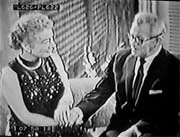 <Alfred Steele walks out, kisses Joan and sits down beside
her>
<Alfred Steele walks out, kisses Joan and sits down beside
her>
ALFRED STEELE: Evening. So nice to meet you.
PETER: It's so nice to see you. Please excuse me, shaking hands across you Joan. May I introduce you to Alfred Steele. And, well sir, would you like to answer this question for us? How do you combine the two? In other words, your own business and the entertainment world of Joan.
ALFRED STEELE: Well, Peter, very often I've been asked that question. I must make this observation first. And I don't want it to sound egotistical but, uh...Miss Crawford has the capacity of being a great wife and a great mother and, uh...take care of our home in splendid style.
PETER: Mmmm hmm.
ALFRED STEELE: And I'm very proud, of course, that she's a great actress. And I again don't...
JOAN: The jury's still out.
<they all laugh>
ALFRED STEELE: And, uh...we have a very happy life together. We work it out so that she does her work and I do mine. As a matter of fact, tomorrow I'm off to Madrid to do some work. I will be back here on the weekend and together we go to Frankfurt for two or three days.
PETER: Now before you go on, Mr. Steele, I think you're rather dodging the issue. You were connected with show business yourself, weren't you?
ALFRED STEELE: Well, in a commercial way, yes Peter. You see, in the States, uh...we, uh...use television and radio and all those things to sell our products. And, uh...we employ a lot of talent, uh...and for instance, one of the greatest experiences that I ever had in one of my previous associations when I was with Standard Oil was to bring Jack Hilton from England and an all-English cast to the United States....
PETER: Have you seen, uh...have you seen Jack since you've been here?
ALFRED STEELE: Not this trip. He was here the day we arrived. And then he went off for a holiday but he'll be back soon. I'm looking forward to seeing him.
PETER: Let me interupt you very quickly again, if I may. Forgive me doing this. I believe Joan also knows a bit about your business too, is that right?
ALFRED STEELE: Well, she, uh....you know, in our business, uh...we're very presumptuous salesmen. We are very forward salesmen. And, uh...people say that I do a pretty good job of selling, but...uh, my wife, uh...when she gets her selling clothes on, she really revs them up!
PETER: So, Mr. Steele, will you forgive us for a second if we talk very quickly now about -- thank you so much for telling us about yourself.
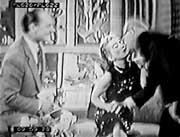 <Alfred stands to leave>
<Alfred stands to leave>
ALFRED STEELE: Thank you. Thank you, cutey.
<Alfred kisses Joan>
PETER: Could we talk very quickly, Joan, about Esther Costello?
JOAN: Yes.
PETER: I mean, what is the story of this picture?
JOAN: This is the story of a woman who goes back to Ireland. She left it six years of age. She goes back because she's a lonely woman. And this is the story of many, many women in the world. It doesn't have to be England, America, Ireland, Scotland...it doesn't matter. And I find...you see, I'm not playing Esther Costello.
PETER: Yes, I was going to ask you that -- you're not playing it?
JOAN: No.
PETER: Well, who is playing the part?
JOAN: Today we chose the most lovely, beautiful child in the whole world.
PETER: Now who is...
JOAN: Except my own four children.
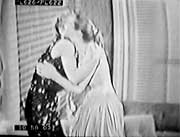 PETER: Yes. Who is she?
PETER: Yes. Who is she?
JOAN: Miss Heather Sears.
<Heather walks out and is hugged by Joan. She then sits down next to Joan>
PETER: Heather Sears, meet our viewers and congratulations on all our behalfs on getting this rather wonderful part.
HEATHER SEARS: Thank you very much!
PETER: And what do you have do in the film?
HEATHER: Well, I should say first of all I have to be a great pantomimist.
PETER: What exactly is that, now? You've got to use your...fingers a lot to, uh...
HEATHER: Yes. I have to, um...I have to...
PETER: Sort of...
HEATHER: Communicate! With my hands.
PETER: And you're not allowed to talk?
JOAN: And with your eyes.
HEATHER: And with my eyes, but not my voice. Because Esther Costello is a blind mute.
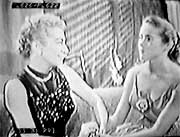 PETER: My goodness, me. So you've really got a lot of work to put
in, between you both, haven't you?
PETER: My goodness, me. So you've really got a lot of work to put
in, between you both, haven't you?
JOAN: Yes!
HEATHER: Yes, we have.
JOAN: We work together well.
HEATHER: I'm sure we will.
PETER: How are you both getting on? Before you go, how are you both getting on with...you know, the film so far? You haven't actually started, have you?
JOAN: No. But we will.
PETER: In a few days time.
JOAN: Yes.
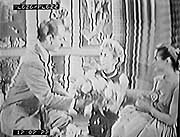 PETER: Bless you both! Thank you so much. Before you go, I just
want one little thing before you do leave. Thank you very much
indeed.
PETER: Bless you both! Thank you so much. Before you go, I just
want one little thing before you do leave. Thank you very much
indeed.
<Flowers are given to Joan and Heather>
With our compliments. Joan Crawford...thank you very much indeed for joining us.
JOAN: Thank you so much. Thank you.
PETER: And Heather...likewise.
HEATHER: Thank you very much indeed.
PETER: Good luck to you both and the picture. Thank you so much for joining us on Picture Parade tonight.
JOAN: Good luck.
HEATHER: Thank you.
JOAN: You know you're gonna be great!
HEATHER: Thank you!
 WOLF
WALTON: Well, Miss Crawford -- Joan, since I've seen so much of
you.
WOLF
WALTON: Well, Miss Crawford -- Joan, since I've seen so much of
you.
JOAN: Please Walton.
WALTON: ...in the few weeks you've been in England. Uh, Esther Costello is your 74th picture.
JOAN: I'm afraid it is.
WALTON: That's a terrible lot of pictures!
JOAN: Oh!
WALTON: An awful lot of pictures!
JOAN: Are you bored?
WALTON: A frightful lot of good pictures!
<Joan chuckles>
WALTON: But it is a large number of pictures for any star to make...because it indicates to me that you've survived at least half a century of directors, any number of co-stars, any number of leading men, and...
JOAN: Well, they're all still living and working.
WALTON: But perhaps not doing quite so well as they were formerly.
JOAN: Oh, I don't know.
WALTON: Well...
JOAN: You know, Rossano Brazzi, who's in this film, and he's done 87 films. Did you know that?
WALTON: Yes. 80 of which we haven't seen over here.
JOAN: Aw, that's not very nice.
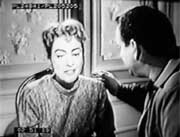 WALTON: My point is this...my point is this, Joan...that here you
are making your 74th international picture, a picture that will be seen by
millions of people all over the world, many of the people that you've worked
with -- talented as they have been -- have not survived. It's
interesting, I think, to try and consider why you have. What is it you
have? What is the quality that you have for the public that makes it want to go
on seeing your pictures?
WALTON: My point is this...my point is this, Joan...that here you
are making your 74th international picture, a picture that will be seen by
millions of people all over the world, many of the people that you've worked
with -- talented as they have been -- have not survived. It's
interesting, I think, to try and consider why you have. What is it you
have? What is the quality that you have for the public that makes it want to go
on seeing your pictures?
JOAN: Well, first of all, I'm stage-struck and I think they all know that. Secondly, I try to get a film that has audience identification.
WALTON: Now, stars like yourself, uh, Joan, are what the public wants and stars are what sells pictures, in spite of the nice stars who tell writers that scripts sell pictures. I tell you as a nice writer, that it's the star who sells it.
JOAN: I've done a few stinkers.
<Joan laughs>
WALTON: Yes, but they've sold.
JOAN: Well...
WALTON: Because you did them. If I did them, I would be out of business immediately.
JOAN: This I doubt.
WALTON: But tell me, this really does bring me to a very important point. How do you feel about those situations in which your virtuosity has to triumph over tenth-rate material?
JOAN: Well, Wolf, I don't think anyone starts out...thinking they're going to make a bad picture. They're hoping that, uh, the director they choose, the producer, the writers and everyone who works on the set with them will offer a bit of advice and help to overcome the weakenesses. And there are weaknesses in every script. In every story. Like your child...a child has weaknesses. Even grownups.
WALTON: Uh, you mean the element of risk is very similar?
JOAN: That's right.
WALTON: You don't know whether it's going to be a boy or a girl or what.
JOAN: That's right.
WALTON: Yes. And you certainly don't know in this business whether it's going to be a success or a failure. And you don't -- I do agree with you -- you don't even know too far in advance whether it's going to be good or bad. But, surely the star must have some standard whereby she selects a particular script to play. It's rudely said sometimes that most stars only count the number of lines.
JOAN: Not me.
WALTON: What do you look for then?
JOAN: I look for, uh...
WALTON: This is good practical information for me, you understand!
JOAN: Varied...varied rolls. Instead of the same one all the time. Even though I did play Cinderella quite a while.
WALTON: For contrast.
JOAN: For contrast. And, it's a very interesting thing about...that I've discovered...that you cast your director as carefully as you cast the star.
WALTON: Well, that is...
JOAN: For comedy, you cast a...
WALTON: Yes.
JOAN: ...man who is great at direction.
WALTON: Well that is so true and I have noticed watching you work today, how closely you work with Mr. David Miller, who's directing Esther Costello. Um, but a great director once admitted to me that believed that no director, no matter how great, no star how wonderful, had more than two or three really great films in them.
JOAN: Not at all, Wolf! Would you like me to cite a few?
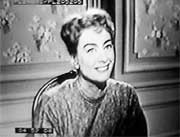 WALTON: Please do.
WALTON: Please do.
JOAN: Mr. Cecil DeMille, Mr. William Wilder, Mr. William Wyler, George Stephens, George Cukor...I'm in a rut with two "Williams" and two "Georges", aren't I?
<Joan and Walton laugh>
WALTON: A successful rut!
JOAN: Shall I go on?
WALTON: Well, I'd like to go on...but, we don't really have time and it's a very long and argumentative subject. Um, let me ask you something very personal. With with the strains and the tensions and the taxation and the impossible hours...what makes a star like yourself -- and there's only one like yourself who's made now...74 international films -- what makes a star want to go on? I mean, surely the danger of having a success and the difficulty of following it...the endless emnity that surrounds success in our business. Is this worth going on with? Do you know what I mean?
JOAN: Oh, yes indeed! Every minute of it! And you know I find that when I'm not working, um, and I don't have to get up at that ungodly hour in the morning at quarter to five, I get very lazy. I really do.
WALTON: And bored? And bored?
JOAN: Well...no, restless.
WALTON: Um, Joan, I hear a rumor around that you're going to retire after this picture.
JOAN: Are you kidding?!? Who, me?!?
<Joan laughs>
Never!
WALTON: I'm glad to hear it.